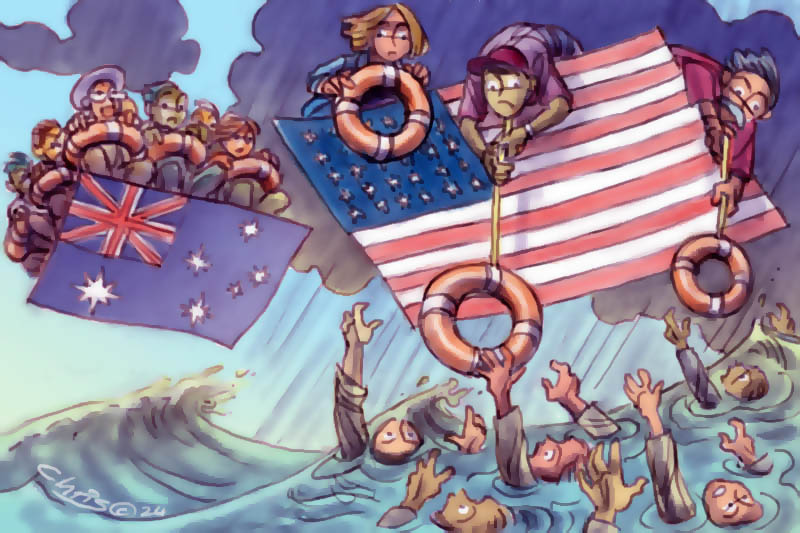When you live in Australia and read about the US, you get the impression that everyone there is crazy-greedy, stupid or just plain nuts. There is a lot of that, but I just spent ten weeks in my country of birth, and this is not the whole story.

I arrived in Atlanta in December to look after my mother at the end of her life. When I was there, I missed almost everything about Australia — the sound of kookaburras at dawn, the clean air, trees without plastic bags hanging from them. Most of all, I missed my Australian children.
When my kids visited for Christmas, all they could say was, ‘Everything’s big!’ The cars, the aisle of breakfast cereals, the sodas, the Targets, the garbage bins.
And yet, what surprised me most about my country were the Americans.
A woman about my age with long black hair slept under a blanket on a bench outside my parents’ upmarket condo. When temperatures dipped below 0 ° C, one of my mother’s friends drove around picking up homeless people and taking them to a shelter.
Another friend of my mother’s volunteered at Crossroads, a free post office for people with no fixed address. An old colleague of my mum’s ran a weekly Zoom support group for women recently released from prison. My best friend from high school delivered free diapers to immigrants living in trailers. ‘Does the government provide the diapers?’ I asked. No, the government provides nothing. All these services are done by individuals or charities.
'In Australia, however, I didn’t pay for my hospital stay. I didn’t even have to work with a newborn. The government paid me to stay home. In the US I had to bring my baby to college and teach while she slept in the car seat at the front of the classroom.'
The 2018 U.N. State of the World’s Volunteerism Report found that Americans volunteered over 14 million hours a year, more than any other country in the world.
Then there was my own situation. My mother was 83. She had lymphoma. The chemo didn’t work; we put her in hospice at home. Friends called daily. They showed up with homemade chicken pot pie and Tuscan soup. When my husband and kids visited, a neighbour in my mum’s building lent us her apartment, changing her holiday plans to stay away longer so we could have her place. We walked in to find the kitchen counter heaped with fruit, potato chips, pistachios, beer, wine, chocolate-covered cherries, and the largest bag of popcorn I’ve ever seen.
I was reminded of having my first baby in the US 16 years ago. She arrived early and had to stay in the NICU; the bill was $80,000. Friends brought dinner every night for weeks. They took my dirty laundry and returned it washed, dried and folded.
When I had a second baby in Australia, Sydney friends rang with congratulations, but it was only our neighbours who were originally from overseas — Japan, Chile, the US — who brought food.
In Australia, however, I didn’t pay for my hospital stay. I didn’t even have to work with a newborn. The government paid me to stay home. In the US I had to bring my baby to college and teach while she slept in the car seat at the front of the classroom.
In the US, when someone gets cancer and they’re not insured, they Crowdfund to pay for the chemo.
All this begs the question: do Americans look after each other because the government doesn’t?
Philanthropy Australia reports that ‘Australia’s total giving — at .81 per cent of GDP — is below global peers’, while Americans give 2.1 per cent of GDP.
Australians pay higher taxes, so they don’t have to give as generously to charity and this system works. If you have any doubts, count the number of homeless wandering the streets of any American city.
It’s not that Australians are ungenerous — they volunteer at high rates, too. And they care enough to vote for a government that provides health care to everyone, and welfare to those without.
I got to know the woman on the bench outside my parents’ condo. Her name was Prophetess Elina Jones. Like me, she had a 12-year-old daughter that she was missing. Her mother had Alzheimer’s and lived in a home where they didn’t clip her toenails, which were black, and curled under her toes. When I gave Elina money, she asked what she could do for me. I told her my mother was dying.
‘I’ll pray for you,’ she said. Elina had the oratory power of a preacher from the other side of town. She said a prayer that rose and fell with emotion; it was long, insistent, almost shaming God into helping. She prayed for my mother to be at peace.
The next day it happened. I walked out into the cold streets of Atlanta and ran into Prophetess Elina Jones wearing her blanket, carrying her bags. ‘How’s your mother?’ she asked.
‘She died.’
‘You look heavy. I’ll pray for you.’ Then she told me about the stillborn boy she’d given birth to two years earlier.
‘Take care of yourself,’ I said.
‘I’m not good at that. But I’ll keep praying for you.’ She looked me in the eyes, ‘Pray for me, too,’ she said. ‘You never know whose prayers you’re living on.’
Sarah Klenbort is a writer and sesional academic at Queensland University, where she teaches creative writing. She also teaches memoir at the Queensland Writers Centre. Sarah's work has appeared in Eureka Street, The Guardian, Best Australian Stories, Overland and other publications here and overseas.
Main image: Chris Johnston illustration